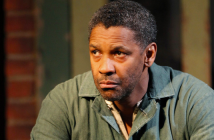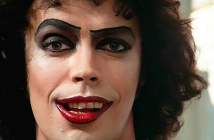
Michael Kostroff (Max), Ashley Spencer Ulla) and David Josefsberg (Leo) in “The Producers” at Paper Mill Playhouse.
The Producers, the hit Broadway musical, now lovingly restaged at Millburn’s Paper Mill Playhouse, proves that its larger-than-life characters, gags, slapstick, and musical numbers still add up to a throughly enjoyable evening of laughs. The book by Mel Brooks and Thomas Meehan and music and lyrics by Brooks hark back to the glory days of musical comedy when the emphasis was on comedy rather than spectacle.
The plot centers on Max Bialystok (Michael Kostroff), a Broadway producer who raises money for his shows from elderly ladies who happily hand over checks in exchange for sex games with the portly, middle-aged Max. Lately, Max’s shows have been flops and his finances have fizzled. And now a young accountant, Leo Bloom (David Josefsberg), has been sent to audit his books.

The company of “The Producers.”
Max is less than welcoming — until Leo casually mentions that, under the right circumstances, a producer could make more money from a flop than from a hit. Max’s eyes light up, and he convinces the timid Leo to join him in a scheme to find the worst play, the worst director, and the worst actors to mount the most dreadful production in the history of Broadway and enrich themselves in the process.
They find the play, “Springtime for Hitler,” locate its author, Franz Liebkind (John Treacy Egan), who idolizes the former fuhrer, sign him onto the project, and hire flamboyant Roger DeBris (Kevin Pariseau) to direct. The plan seems foolproof as Max’s safe fills with stacks of cash from his loyal backers.
The current production benefits tremendously from two strong leads. Mr. Kostroff is excellent as the money-driven, frantic Max. His comic timing is perfect and he navigates the slapstick schtick with the grace of Chaplin. His first song, “The King of Broadway,” amusingly establishes his character. Max loves Broadway but has fallen so short of success with recent shows that the “Opening Night” sign on the theatre marquee can easily be flipped to “Closing Night.” With black cape and hat, his self-proclaimed emblem of the Broadway producer, he struts around like Ziegfeld, even though his achievements fall far short of legendary.
Mr. Josefsberg captures Leo’s timidity and introversion early on, when he’s practically coerced by Max into entering into an illegal scheme. But it’s his tedious job at an accounting firm with a bellowing boss that inspires him to sing “I Wanna Be a Producer,” and the stage is set for comic mayhem.
Swedish actress Ulla (Ashley Spencer), a leggy knock-out, shows up early to audition for the new partnership of Bialystok and Bloom. After she provocatively sings “When You Got It, Flaunt It,” Max and Leo hire her on the spot.
Mr. Pariseau steals most of his scenes with his swishy, overly ebullient enthusiasm, and Mark Price, as his houseboy/boyfriend Carmen Ghia, gets most of his laughs with his rubbery body and exaggerated entrances and exits. Both actors amp up the comedy as Max’s plan appears to be taking shape as planned. Pariseau sings with jolly abandon his plan for bringing the play to Broadway to the tune “Keep It Gay” as an assortment of colorful folks join in for the chorus, providing one of the funniest numbers in the show.
Don Stephenson has recreated the original direction by Susan Stroman, and Bill Burns has re-created her original choreography, which is lively and often infused with little comedy bits. A number set in Little Old Lady Land is especially funny as a chorus line of septuagenarians engage in elaborate dance steps with the help of their walkers. Martha Bromelmeier recreates the original costume designs by William Ivey Long. The big Ziegfeld-style production number, “Springtime for Hitler,” has to be one of the funniest in musical comedy history. A tenor (John Jeffords) dressed as a Nazi officer belts out the tune as long-legged beauties in elaborate costumes with headgear supporting giant pretzels, sausages, and beer steins descend a staircase.
The original Broadway show starred the terrific team of Nathan Lane and Matthew Broderick. Though Kostroff and Josefsberg don’t have the same degree of name recognition, they nail the jokes and milk every laugh from the Brooks/Meeham script. They are also accomplished singers. Mr. Kostroff performs a tour de force number with “Betrayed,” in which he recaps the show up to that point as he analyzes how his devious scheme hasn’t gone as planned, and Josefsberg duets with him on “We Can Do It,” once Max and Leo team up to bilk investors of a fortune.
The show will run at the Paper Mill Playhouse through October 23. Performances are Wednesday at 7:30 P.M., Thursday at 1:30 and 7:30 P.M., Friday at 8 P.M., Saturday at 1:30 and 8 P.M., and Sunday at 1:30 and 7 P.M. Tickets may be purchased by calling (973) 376-4343, at the Paper Mill Playhouse box office at 22 Brookside Drive in Millburn, or online at www.PaperMill.org.



